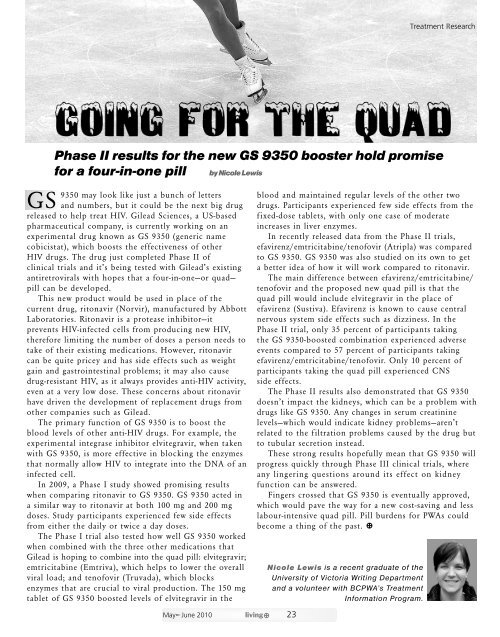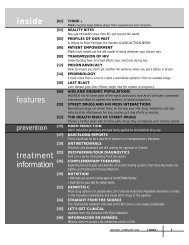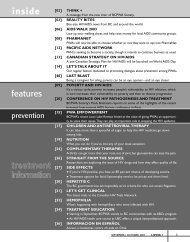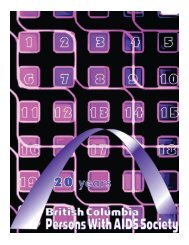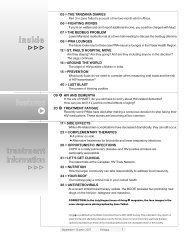liv poz mag.qxd - Positive Living BC
liv poz mag.qxd - Positive Living BC
liv poz mag.qxd - Positive Living BC
Create successful ePaper yourself
Turn your PDF publications into a flip-book with our unique Google optimized e-Paper software.
Treatment Research<br />
GS<br />
Phase II results for the new GS 9350 booster hold promise<br />
for a four-in-one pill by Nicole Lewis<br />
9350 may look like just a bunch of letters<br />
and numbers, but it could be the next big drug<br />
released to help treat HIV. Gilead Sciences, a US-based<br />
pharmaceutical company, is currently working on an<br />
experimental drug known as GS 9350 (generic name<br />
cobicistat), which boosts the effectiveness of other<br />
HIV drugs. The drug just completed Phase II of<br />
clinical trials and it’s being tested with Gilead’s existing<br />
antiretrovirals with hopes that a four-in-one—or quad—<br />
pill can be developed.<br />
This new product would be used in place of the<br />
current drug, ritonavir (Norvir), manufactured by Abbott<br />
Laboratories. Ritonavir is a protease inhibitor—it<br />
prevents HIV-infected cells from producing new HIV,<br />
therefore limiting the number of doses a person needs to<br />
take of their existing medications. However, ritonavir<br />
can be quite pricey and has side effects such as weight<br />
gain and gastrointestinal problems; it may also cause<br />
drug-resistant HIV, as it always provides anti-HIV activity,<br />
even at a very low dose. These concerns about ritonavir<br />
have driven the development of replacement drugs from<br />
other companies such as Gilead.<br />
The primary function of GS 9350 is to boost the<br />
blood levels of other anti-HIV drugs. For example, the<br />
experimental integrase inhibitor elvitegravir, when taken<br />
with GS 9350, is more effective in blocking the enzymes<br />
that normally allow HIV to integrate into the DNA of an<br />
infected cell.<br />
In 2009, a Phase I study showed promising results<br />
when comparing ritonavir to GS 9350. GS 9350 acted in<br />
a similar way to ritonavir at both 100 mg and 200 mg<br />
doses. Study participants experienced few side effects<br />
from either the daily or twice a day doses.<br />
The Phase I trial also tested how well GS 9350 worked<br />
when combined with the three other medications that<br />
Gilead is hoping to combine into the quad pill: elvitegravir;<br />
emtricitabine (Emtriva), which helps to lower the overall<br />
viral load; and tenofovir (Truvada), which blocks<br />
enzymes that are crucial to viral production. The 150 mg<br />
tablet of GS 9350 boosted levels of elvitegravir in the<br />
MayqJune 2010 <strong>liv</strong>ing5 23<br />
blood and maintained regular levels of the other two<br />
drugs. Participants experienced few side effects from the<br />
f ixed-dose tablets, with only one case of moderate<br />
increases in <strong>liv</strong>er enzymes.<br />
In recently released data from the Phase II trials,<br />
efavirenz/emtricitabine/tenofovir (Atripla) was compared<br />
to GS 9350. GS 9350 was also studied on its own to get<br />
a better idea of how it will work compared to ritonavir.<br />
The main difference between efavirenz/emtricitabine/<br />
tenofovir and the proposed new quad pill is that the<br />
quad pill would include elvitegravir in the place of<br />
efavirenz (Sustiva). Efavirenz is known to cause central<br />
nervous system side effects such as dizziness. In the<br />
Phase II trial, only 35 percent of participants taking<br />
the GS 9350-boosted combination experienced adverse<br />
events compared to 57 percent of participants taking<br />
efavirenz/emtricitabine/tenofovir. Only 10 percent of<br />
participants taking the quad pill experienced CNS<br />
side effects.<br />
The Phase II results also demonstrated that GS 9350<br />
doesn’t impact the kidneys, which can be a problem with<br />
drugs like GS 9350. Any changes in serum creatinine<br />
levels—which would indicate kidney problems—aren’t<br />
related to the f iltration problems caused by the drug but<br />
to tubular secretion instead.<br />
These strong results hopefully mean that GS 9350 will<br />
progress quickly through Phase III clinical trials, where<br />
any lingering questions around its effect on kidney<br />
function can be answered.<br />
Fingers crossed that GS 9350 is eventually approved,<br />
which would pave the way for a new cost-saving and less<br />
labour-intensive quad pill. Pill burdens for PWAs could<br />
become a thing of the past. 5<br />
Nicole Lewis is a recent graduate of the<br />
University of Victoria Writing Department<br />
and a volunteer with <strong>BC</strong>PWA’s Treatment<br />
Information Program.


